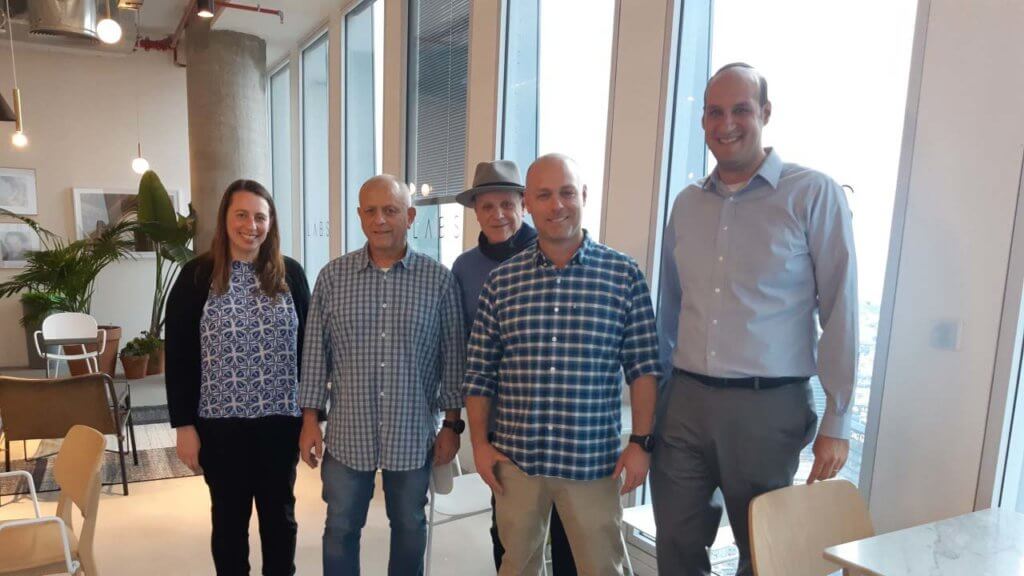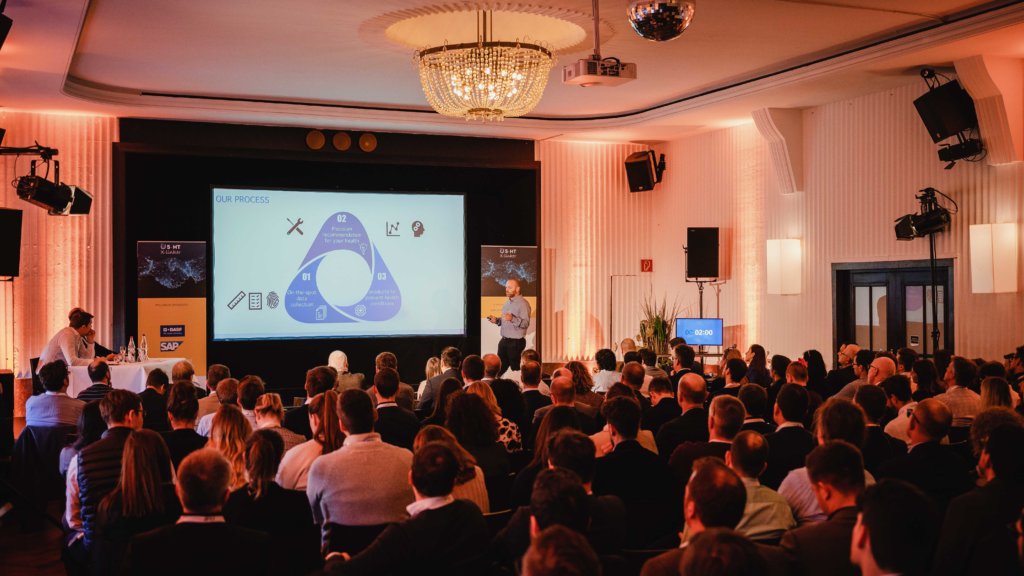What Our Skin Tells Us About Our Body
Judith Hillen
There is more to the human skin than meets the eye. The Israel based startup MYOR has developed a method to analyze skin and to combine this data with Artificial Intelligence, making it possible to predict the individual risk of developing certain conditions. CEO Idan Katz presents MYOR’s business model and shares his insights into current developments on the healthcare market: Why is it becoming more and more popular to focus on prevention instead of treatment? How can AI help to achieve better diagnostic results? And how can pharmacies and retailers compete with ever-growing e-commerce?
 MYOR Team
MYOR TeamThe idea of MYOR is to learn something about the inside of our body “from the outside in”, by examining the human skin. What can our skin tell us about our body?
It is important to understand that the skin is not just the cover of our body – it is our biggest organ. The skin is continuously changing, it is connected to everything inside our body, it is our interface with the outside world. All health issues can be seen in our skin – not just by looking at our skin, but by measuring specific scientifically proven biomarkers. These can vary from biophysical and optical biomarkers to metabolic products and the microbiome, the diverse microorganisms living on our skin. We believe that the skin is the ideal platform to learn more about our health: The analysis is non-invasive and painfree, and our methods make it possible to get immediate results.
What specific health issues do you address by analyzing the human skin?
Our focus lies on prevention: For example, we can predict infants’ risks of developing food allergies or Atopic Dermatitis. It has been shown that the parameter of Transepidermal Water Loss (TEWL) – how much water you lose through your skin – is linked to these allergic conditions. In addition to analyzing the skin, we include individual data about the infant and its environment. By employing AI methods, we can assess the infant’s risk to develop food allergies or Atopic Dermatitis in the future. This is a unique approach, because up to now there are no qualitative scientific tools to predict and to prevent these allergic conditions.
How do you combine skin monitoring with Artificial Intelligence?
We do not only analyze the skin, we also ask our customers to fill out a questionnaire about different parameters. Based on a multitude of clinical studies, we have identified 25 relevant parameters, regarding family history, the baby itself or the living environment. Some of them are risk factors, some are protective factors. For example, having a dog in the house is a protective factor when it comes to the risk of developing allergic conditions, because a dog brings new microbiomes into the environment and causes more interactions between the family's microbiome. We have also analyzed the extent to which each parameter contributes to the risk. On this basis, we have built an algorithm to predict the risk of developing specific allergic conditions.
Why is it so important to predict these conditions before they develop?
Currently, there is a shift from treatment to prevention in healthcare systems around the world. In many countries, healthcare systems are not well equipped to provide care for growing and aging populations. As the saying goes, “An ounce of prevention is worth a pound of cure” – you need to invest a lot more in treating a disease than in preventing it. Nowadays, people have a growing awareness of the importance of health. They are increasingly interested in personalized solutions that help them stay healthy. We need to find new solutions to make that possible.
How do you help to not only diagnose, but also prevent health conditions?
We do not only offer diagnostics, but also preventive care solutions. For example, if we know that a baby has a high risk for food allergies, we can prevent that by giving a medical snack containing a low dose of allergens. If we find out that a baby has iron deficiency – which we can also test by analyzing the skin –, we can give the right supplement to increase iron levels.
How does your system work for your customers?
We are starting to implement a unique business model. Our monitoring and diagnostic solutions can be conducted at different Health Access Points – in hospitals, retail pharmacies, or other accessible spaces. This is a win-win situation: Pharmacies and retailers are losing more and more traffic to e-commerce. Therefore, they are looking for new ways to give value to their customers. Our solution is to offer personalized, highly attractive products for preventive care. Medical services have been offered in retail locations for a number of years, yet their offerings have been very simple, blood pressure or weight measurements, and have not offered any solutions. Our idea is that you can go to the pharmacy, get checked for free, instantly receive your results, and if a specific risk or deficiency is detected, you immediately are offered the suitable product for prevention. Our devices and our software are free of charge. We only generate revenue with the recommended products we sell. As there is a high global prevalence of iron deficiency, Atopic Dermatitis, and food allergies, this revenue will be high enough for a profitable business.
How did you develop the idea for MYOR?
MYOR was founded by Prof. Roni Kohn, former head of the School of Pharmacy of the Hebrew University of Jerusalem and expert in human skin biochemistry, Dr. Ariel Katz, a successful serial entrepreneur, and Michael Brandwein, an expert in the field of the skin microbiome. They developed the idea for MYOR by talking to retailers across the market and learning about the need for preventive solutions. They had already studied the subject of biomarkers on an academic level for many years and were able to take this idea and translate it into a business model. My background lies in data analysis. Before joining MYOR, I led a data analysis team in the field of mineral exploration. This may sound like it is very different from healthcare, but in the end, both cases are about analyzing data and finding new uses for existing technologies.
What is MYOR currently working at?
It is very important for us to enter the market soon. Of course, we could sit in the office and talk about our concept for five years, but as a startup we need to go to the market and see what adjustments we need to make. Therefore, we are planning to start sales in 2020, beginning with Atopic Dermatitis, followed by food allergies – first peanuts, then lactose, then other foods. We are also actively developing new products. Currently, we are exploring biomarkers indicating depression: It is a well-known fact that there is a link between depression and certain skin conditions. For our market entry, we have already started cooperating with strong retail pharmacy chains in Thailand and Mexico, and we also have a partner in Israel. Next, we want to target the USA and Europe. To make our vision come true, we are looking for strategic partners in new markets with positive incentives.
What does your vision for the future look like?
We aim to transform healthcare from treatment to prevention for everybody. Today, customers can already get personalized recommendations for many different kinds of products. Based on data, companies can predict which movies or books we are going to like. With MYOR, we want to establish a system that tells people in a similar personalized way what their body needs to be healthy, and we believe that analyzing the skin is the ideal starting point for that.
You have just participated at the 5-HT X-linker startup program and are part of the 5-HT network. What did you take from the program and what do you expect from being part of our network?
 CEO Idan Katz at the 5-HT X-linker final
CEO Idan Katz at the 5-HT X-linker finalThe program has provided us with a deeper understanding of what a startup-corporate collaboration looks like from the corporate’s side. This of course helps us to sharpen our messaging.
We also had the chance to explore the European market – challenges and opportunities, which really was a jump-start for us to this market.
In addition, we hope that by being a part of the 5-HT network we will have the initial access to the relevant corporates as well as investors.
5-HT Chemistry & Health Newsletter
Want the latest tech and industry news, events, relevant info from the ecosystem and more?
Subscribe to 5-HT Newsletter now Subscribe to 5-HT Newsletter now
Become part of the 5-HT Chemistry & Health
Exchange ideas with innovative startups and future-oriented companies in our ecosystem. We look forward to meeting you!